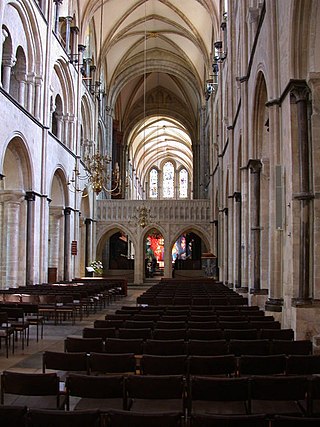Related Research Articles

Henry King was an English poet who served as Bishop of Chichester.

Peter Mews was an English Royalist theologian and bishop. He was a captain captured at Naseby and he later had discussions in Scotland for the Royalist cause. Later made a bishop he would report on non-conformist families.

The Diocese of Chichester is a Church of England diocese based in Chichester, covering Sussex. It was founded in 681 as the ancient Diocese of Selsey, which was based at Selsey Abbey, until the see was translated to Chichester in 1075. The cathedral is Chichester Cathedral and the diocesan bishop is the Bishop of Chichester. The diocese is in the Province of Canterbury.

The Bishop of Chichester is the ordinary of the Church of England Diocese of Chichester in the Province of Canterbury. The diocese covers the counties of East and West Sussex. The see is based in the City of Chichester where the bishop's seat is located at the Cathedral Church of the Holy Trinity. On 3 May 2012 the appointment was announced of Martin Warner, Bishop of Whitby, as the next Bishop of Chichester. His enthronement took place on 25 November 2012 in Chichester Cathedral.
Hugh Lloyd was a Welsh cleric who was the Anglican bishop of Llandaff from 1660 until his death in 1667.
Ralph Brideoake (1612/13–1678) was an English clergyman, who became Bishop of Chichester.

Chichester Theological College (1838–1994) was an Anglican theological college for the Diocese of Chichester in Sussex, England. Its churchmanship was high church and Anglo-Catholic.

Robert Grove (1634–1696) was an English Bishop of Chichester.
Nathaniel Hardy (1618–1670) was an English churchman, Dean of Rochester from 1660.
The Archdeacon of Hastings is a senior ecclesiastical officer in the Church of England Diocese of Chichester. The Diocese of Chichester almost exactly covers the counties of East and West Sussex and the City of Brighton and Hove, stretching for nearly a hundred miles (160 km) along the south coast of England.

The post of Archdeacon of Chichester was created in the 12th century, although the Diocese of Sussex was founded by St Wilfrid, the exiled Bishop of York, in AD 681. The original location of the see was in Selsey. The see was moved to Chichester, in about 1075, by decree of the Synod of London. Currently, Luke Irvine-Capel is the Archdeacon.
The Archdeacon of Horsham is a senior ecclesiastical officer in the Church of England Diocese of Chichester. The diocese almost exactly covers the counties of East and West Sussex and the City of Brighton and Hove, stretching for nearly a hundred miles (160 km) along the south coast of England.
Combe Miller was a Church of England clergyman. He was the third son of Sir John Miller, 4th Baronet Miller of Froyle and Susan Combe.
Edward More (1480–1541) was an English churchman and educator, Archdeacon of Lewes from 1527 to 1541.
Richard Bowchier was the Archdeacon of Lewes from 1693 until 1723. He was also known as an antiquarian.
Edmund Bateman (1704–1751) was an English cleric and academic, the Archdeacon of Lewes from 1737 until 1751.
John Courtail was an English cleric, Archdeacon of Lewes from 1770 until 1806.
William Bruère Otter was an Anglican cleric who was the Archdeacon of Lewes from 1855 until his death in 1876.
The history of Christianity in Sussex includes all aspects of the Christianity in the region that is now Sussex from its introduction to the present day. Christianity is the most commonly practised religion in Sussex.
Toby Henshaw was the Archdeacon of Lewes from 1670 until his death in 1681. Born in Sussex and educated at Clare College, Cambridge, he was ordained in 1672 and held the livings at Henfield and Cuckfield. He was Treasurer of Chichester Cathedral from 1672 to his death. He was buried at Cuckfield on 25 November 1681.
References
- ↑ ”Chichester Diocese Clergy Lists:Clergy succession from the earliest times to the year 1900" Hennessy,G: London, St Peter's Press, 1900
- ↑ Alumni Oxon 1500-1714, Kandruth-Kyte
- 1 2 3 Henry King (1843). John Hannah (ed.). Poems and Psalms. pp. xcv–xcvii. Retrieved 28 August 2013.
- ↑ Anthony à Wood; Philip Bliss (1815). Athenae Oxonienses: An Exact History of All the Writers and Bishops who Have Had Their Education in the University of Oxford. To which are Added the Fasti, Or Annals of the Said University. Rivington. p. 1669. Retrieved 28 August 2013.